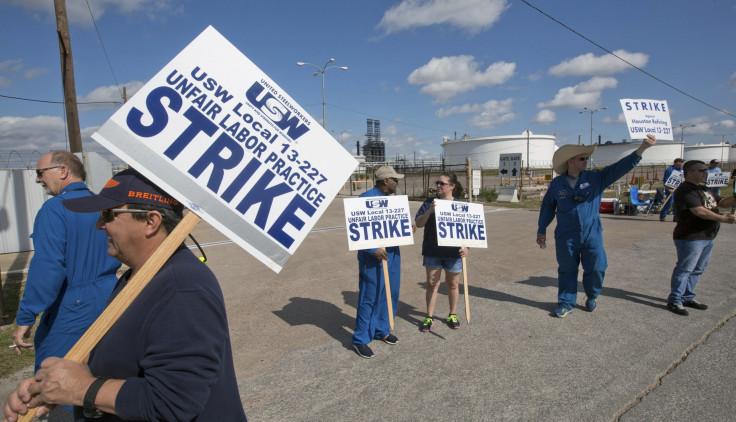Oil Refinery Strike: Union Leaders Cite ‘Bad-Faith Bargaining,’ Threaten To Expand Walkouts To Two More Refineries

More than 1,400 more refinery workers Saturday prepared to join the week-old oil refinery strike, expanding the walkout to two BP-operated refineries in Indiana and Ohio, Reuters reported. The United Steelworkers (USW) labor action is the union's biggest since 1980.
The additional walkouts, set to begin Sunday, would bring the total number of plants whose workers were on strike to 11 and comes three days after union leaders rejected a sixth contract offer from Royal Dutch Shell, the lead negotiator for major oil companies operating refineries in the U.S. The union represents workers at more than 200 chemical plants and refineries across the country and has been in negotiations with Shell on a pattern agreement since January.
The union has said the negotiators are guilty “bad-faith bargaining." Union negotiators cited "threats issued to workers if they joined the strike” as their reasoning for expanding the walkouts, Reuters reported. Workers at BP locations in Toledo, Ohio, and Whiting, Indiana, were expected to leave their posts early Sunday.
The nine refineries where workers have already walked out account for about 13 percent of U.S. refining capacity; however, the strike has had little effect on production. Some 4,000 workers have been picketing in California, Kentucky and Texas for the past week. All refineries involved in the strike have continued to operate using temporary workers.
The USW indicated it would likely widen its refinery strike Friday. Weekend rallies were scheduled at all the refineries as well as at Shell Oil’s headquarters in Houston. Union leaders and Shell Oil representatives have failed to reach agreements on things like wages, working conditions and employee benefits, the Chicago Tribune reported.
Talks have taken place at the national as well as local levels. The pattern agreement will serve as the template for oil companies negotiating local contracts.
“BP remains at the negotiating table and is committed to reaching an agreement that provides good wages while giving management the flexibility it needs to enhance safety, improve efficiency and remain competitive with others in the industry,” BP spokesman Scott Dean said in a statement, according to FuelFix. “We hope this strike will be as short as possible and for workers to return with a contract that ensures long-term prosperity for everyone.”
© Copyright IBTimes 2025. All rights reserved.




















